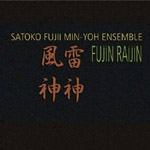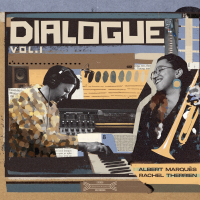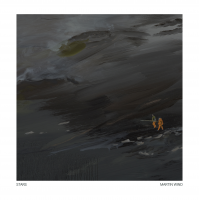Home » Jazz Articles » Multiple Reviews » Nusrat Fateh Ali Khan & Michael Brook: Mustt Mustt & Night Song
Nusrat Fateh Ali Khan & Michael Brook: Mustt Mustt & Night Song
Singer Ustad Nusrat Fateh Ali Khan collaborated with Canadian guitarist Michael Brook on these two outstanding albums in the early to mid 1990s, aiming to reach a cosmopolitan audience by blending his traditional, religious singing style with western production values. During these years, Khan's work made successful connections in broader, secular settings throughout the world, and he was featured on Bollywood and even Hollywood soundtracks (the latter including Natural Born Killers and Dead Man Walking).
By the end of the decade, Khan was widely recognised as the greatest qawwali (sufi devotional songs) singer of his era, partly due to his adventurous approach of blending various singing styles, ranging from commercial movie songs to revered Indian classical material. By this time, he was also a popular choice for innovative, club culture production artists, turntablists and vocal sample hunters, including Massive Attack, Talvin Singh, Bally Sagoo and Peter Gabriel.
 Ustad Nusrat Fateh Ali Khan & Michael Brook
Ustad Nusrat Fateh Ali Khan & Michael Brook
Mustt Mustt
Real World
1990
Recorded with six years between them, Mustt Mustt (Real World, 1990) and Night Song (Real World, 1996) give an insight into a unique crossover project—Khan distancing himself somewhat from the traditional qawwali setup to explore Indian classical alaap and sargam forms, and Brooks excising eastern instruments for a more guitar, bass and drum laden ambient approach.
Khan popularized the khayal (vocal improvisation on a short verse) style of singing in qawwali more than any of his predecessors. Though khayal is a genre in Indian classical repertoire singing, its extensive use in Nusrat's qawwalis helped him garner praise from world music enthusiasts beyond Pakistan. Because Khan often challenged the strict regime of scale and structure followed under Indian classical music, his name doesn't frequently appear in the purist's list of Indian classical greats; yet he is still the most popular traditional singer among the masses.
With Mustt Mustt and Night Song, Khan comes out clear with his uninhibited aspiration to delve into classical style and distance, if not altogether to shun his traditional style of singing. On Mustt Mustt, he uses significant qawwali verses in just the first two songs ("Mustt Mustt (Lost In His Work)" and "Nothing Without You (Tery Bina);" the rest of the album is his adventurous foray into improvised singing in the khayal genre. What's most interesting is his extensive use of taranas (gibberish syllables) evident in songs like "Taa Deem" (Mustt Mustt) and "Avenue" (Mustt Mustt).
There are other subtle, and innovative, elements on these albums worth mentioning, including Khan's technique of note-blending, as highlighted on "Intoxicated" and "Sweet Pain"(Night Song) and "Tracery"(Mustt Mustt); melodic alaaps like "Lament" and "Night Song" (Night Song) and "Sea Of Vapours"(Mustt Mustt); and vocal vibratos in "Crest"(Night Song), "The Game"(Mustt Mustt) and "Fault Lines"(Mustt Mustt).
 Ustad Nusrat Fateh Ali Khan & Michael Brook
Ustad Nusrat Fateh Ali Khan & Michael Brook Night Song
Real World
1996
Night Song, recorded six years after Mustt Mustt, which reached number 4 on the Billboard world music chart, is a much more mature album. Khan gives more space to guitarist Brook, who complements it with succinct bass and drums parts. Night Song has an underlying theme of longing and lament; it also has concrete verses, in contrast to the non-figurative, abstract singing featured on Mustt Mustt, and "build-up" tempos which reach a climax on each song. It's interesting to note Khan singing on occasions at a slightly faster tempo than the bass and drums, creating a wonderful, mystical ambience that's instantly adorable.
Yet Khan's singing is seemingly effortless here, and seems to defy the genre itself—high-tempo, high-octave, khayal singing requires a fair amount of dynamism and Khan does this wonderfully on each song. Night Song could have been a career highlight if Khan hadn't sung it outside the traditional style he's best known for, and thus having it labeled a fusion album.
These are two very important albums—insistent yet melancholic, sacrilegious for purists, innovative for radicals—with Khan at his adventurous best.
Tracks and Personnel
Mustt Mustt
Tracks: Mustt Mustt (Lost In His Work); Nothing Without You (Tery Bina); Tracery; The Game; Taa Deem; Sea Of Vapours; Fault Lines; Tana Dery Na; Shadow; Avenue; Mustt Mustt [Massive Attack Remix].
Personnel: Nusrat Fateh Ali Khan: vocals; Michael Brook: production.
Night Song
Tracks: My Heart, My Life; Intoxicated; Lament; My Comfort Remains; Longing; Sweet Pain; Night Song; Crest.
Personnel: Nusrat Fateh Ali Khan: vocals; Michael Brook: production.
Tags
PREVIOUS / NEXT
Support All About Jazz
 All About Jazz has been a pillar of jazz since 1995, championing it as an art form and, more importantly, supporting the musicians who make it. Our enduring commitment has made "AAJ" one of the most culturally important websites of its kind, read by hundreds of thousands of fans, musicians and industry figures every month.
All About Jazz has been a pillar of jazz since 1995, championing it as an art form and, more importantly, supporting the musicians who make it. Our enduring commitment has made "AAJ" one of the most culturally important websites of its kind, read by hundreds of thousands of fans, musicians and industry figures every month.



















